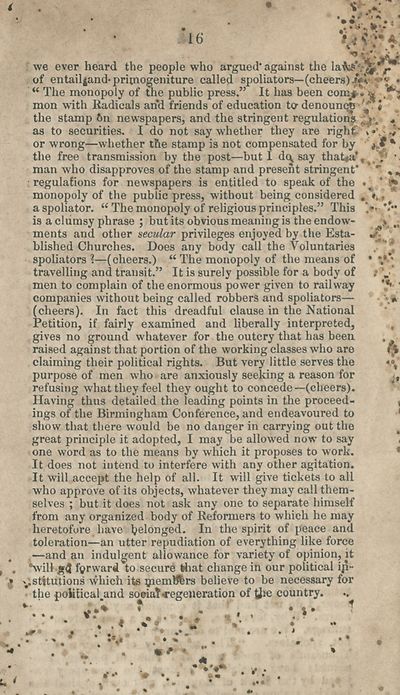Download files
Complete book:
Individual page:
Thumbnail gallery: Grid view | List view

we ever heard the people who argued' against the
of entailfand-pritnogeniture called spoliators—(cheers) .wv
“ The monopoly of the public press.” It has been corn^V ^
mon with Radicals arid friends of education to denounqjj ''
the stamp 6n newspapers, and the stringent regulation^ ^
as to securities. I do not say whether they are right , •
or wrong—whether the stamp is not compensated for by *
the free transmission by the post—but I d<j say that»a',t,
man who disapproves of the stamp and present stringent'
regulations for newspapers is entitled to speak of the
monopoly of the public press, without being considered *
a spoliator. “ The monopoly of religious principles.” This >■
is a clumsy phrase ; but its obvious meaning is the endow¬
ments and other secular privileges enjoyed by the Esta- j
blished Churches. Does any body call the Voluntaries
spoliators ?—(cheers.) “ The monopoly of the means of •
travelling and transit.” It is surely possible for a body of
men to complain of the enormous power given to railway
companies without being called robbers and spoliators—
(cheers). In fact this dreadful clause in the National
Petition, if fairly examined and liberally interpreted,
gives no ground whatever for the outcry that has been
raised against that portion of the working classes who are
claiming their political rights. But very little serves the
purpose of men who are anxiously seeking a reason for
refusing what they feel they ought to concede—(cheers).
Having thus detailed the leading points in the proceed¬
ings of the Birmingham Conference, and endeavoured to
show that there would be no danger in carrying out the
great principle it adopted, I may be allowed now to say
one word as to the means by which it proposes to work.
It does not intend to interfere with any other agitation.
It will accept the help of all. It will give tickets to all
who approve of its objects, whatever they may call them¬
selves ; but it does not ask any one to separate himself
from any organized body of Reformers to which he may
heretofore have belonged. In the spirit of peace and
toleration—an utter repudiation of everything like force
,—and an indulgent allowance for variety of opinion, it
*wilt gd fvrward to secure that change ih our political ip-
N.;stitutions which ite tpemUfers believe to be necessary for
• the poKlical.and soeiatcegeneration of U:e country.
of entailfand-pritnogeniture called spoliators—(cheers) .wv
“ The monopoly of the public press.” It has been corn^V ^
mon with Radicals arid friends of education to denounqjj ''
the stamp 6n newspapers, and the stringent regulation^ ^
as to securities. I do not say whether they are right , •
or wrong—whether the stamp is not compensated for by *
the free transmission by the post—but I d<j say that»a',t,
man who disapproves of the stamp and present stringent'
regulations for newspapers is entitled to speak of the
monopoly of the public press, without being considered *
a spoliator. “ The monopoly of religious principles.” This >■
is a clumsy phrase ; but its obvious meaning is the endow¬
ments and other secular privileges enjoyed by the Esta- j
blished Churches. Does any body call the Voluntaries
spoliators ?—(cheers.) “ The monopoly of the means of •
travelling and transit.” It is surely possible for a body of
men to complain of the enormous power given to railway
companies without being called robbers and spoliators—
(cheers). In fact this dreadful clause in the National
Petition, if fairly examined and liberally interpreted,
gives no ground whatever for the outcry that has been
raised against that portion of the working classes who are
claiming their political rights. But very little serves the
purpose of men who are anxiously seeking a reason for
refusing what they feel they ought to concede—(cheers).
Having thus detailed the leading points in the proceed¬
ings of the Birmingham Conference, and endeavoured to
show that there would be no danger in carrying out the
great principle it adopted, I may be allowed now to say
one word as to the means by which it proposes to work.
It does not intend to interfere with any other agitation.
It will accept the help of all. It will give tickets to all
who approve of its objects, whatever they may call them¬
selves ; but it does not ask any one to separate himself
from any organized body of Reformers to which he may
heretofore have belonged. In the spirit of peace and
toleration—an utter repudiation of everything like force
,—and an indulgent allowance for variety of opinion, it
*wilt gd fvrward to secure that change ih our political ip-
N.;stitutions which ite tpemUfers believe to be necessary for
• the poKlical.and soeiatcegeneration of U:e country.
Set display mode to:
![]() Universal Viewer |
Universal Viewer | ![]() Mirador |
Large image | Transcription
Mirador |
Large image | Transcription
| Antiquarian books of Scotland > Politics & government > Complete suffrage > (20) |
|---|
| Permanent URL | https://digital.nls.uk/125712367 |
|---|
| Description | Thousands of printed books from the Antiquarian Books of Scotland collection which dates from 1641 to the 1980s. The collection consists of 14,800 books which were published in Scotland or have a Scottish connection, e.g. through the author, printer or owner. Subjects covered include sport, education, diseases, adventure, occupations, Jacobites, politics and religion. Among the 29 languages represented are English, Gaelic, Italian, French, Russian and Swedish. |
|---|

